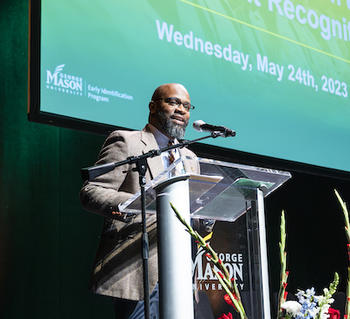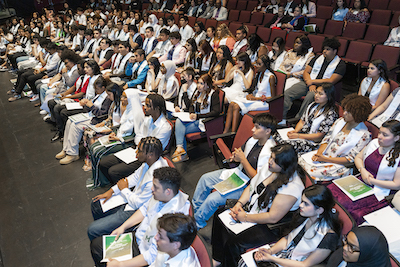Noel Quezada learned about George Mason University’s Early Identification Program during his freshmen year of high school, and the program ignited his aspirations for higher education.

EIP serves first-generation, college-bound students in grades 7-12 in seven Northern Virginia school systems. Mason establishes a long-term relationship with these students, giving the skills and tools they need to pursue their college dreams, with the help of mentors and advisors.
“I like to credit the Early Identification Program for a lot of my successes,” said Quezada. Before EIP, he added, “I actually had no clue what the journey to college even was.”
Quezada, a first-generation student, graduated in May 2023 from Mason with a bachelor of science in criminology, law and society, and minors in forensic and general psychology. He is now commissioned as a second lieutenant in the U.S. Army.
Quezada was one of the 27 Mason EIP graduates joining the ranks of Mason alumni this year, along with 130 graduating high school seniors celebrating their EIP graduation May 24, as part of EIP’s 32nd graduating class. They join the more than 2,100 students who have graduated from the program, which began in 1987.

“EIP students are particularly special,” said Khaseem Davis, EIP’s executive director. “They are not only creating a better and brighter future for themselves, but they also set an example for those around them, proving that with determination and grit, anyone can achieve their dreams.”
“The holistic part of the program is being able to not only foster the educational growth,” Quezada said, “but also to seek wisdom from mentors on just about anything.” Quezada also served as an advisor in the program, encouraging younger participants to take advantage of every opportunity given to them.
Like Quezada, EIP graduation speaker Bianca Otero, who goes by Angel, was inspired by EIP to launch their higher education journey. “I was recommended by a teacher back when I was in middle school. I had no clue what it was, really, but I went ahead and applied and started the program in 7th grade,” they said. Otero received a full tuition scholarship from Mason, graduating with a major in conflict analysis and resolution, and a minor in Spanish.
Otero describes their years in EIP as a comprehensive student experience. “We had success coaches who checked on our mental health and extracurricular activities,” said Otero, who credits a lot of their academic success and growth to the EIP program. Now that they have graduated, they are considering graduate school and entertaining the idea of teaching abroad.
“These students are a great representation of the diversity and inclusivity of Mason,” Davis said. “Through donors and community support, the program has and can literally change the lives and trajectory of people, starting from a young age.”
